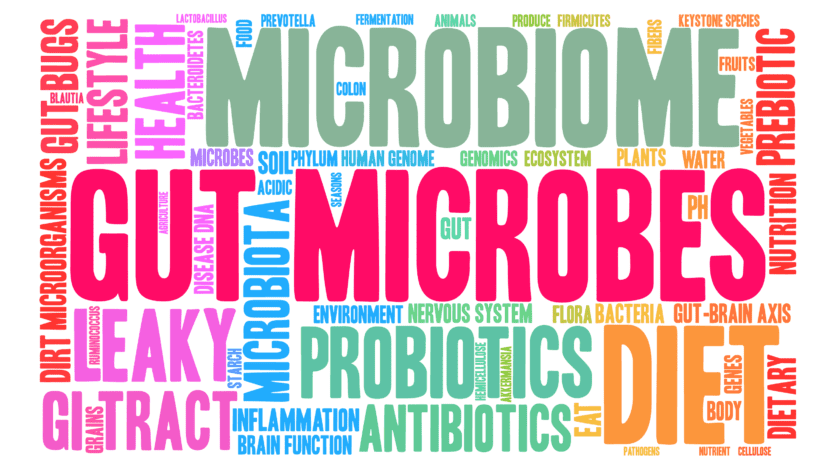The health of the gut has been a topic of increasing research and discussion lately, and more people are aware of their “gut microbiome” than ever before. But what does it all mean? Here’s why your gut health affects your overall health.
What is Gut Microbiome?
Basically, gut microbiome is home to all the bacteria in your digestive tract (intestines). The human gut is a complex ecosystem composed of about 100 trillion bacteria and 300 to 500 different species of bacteria.

Three Key Functions of the Gut Microbiome
At one time, the digestive system was considered a simple body system, consisting of a long tube that enables us to eat, absorb, and excrete. But over the years, numerous studies have demonstrated a connection between gut health and overall health.
The gut microbiome has these primary essential functions:
1. Protects against infection. Seventy percent of your immune system is located in your digestive tract. That’s because 70% of the cells that make up your immune system are housed in the gut wall. Maintaining a healthy gut helps to maintain a strong immune system.
2. Strengthens the intestinal barrier. A functional intestinal barrier allows nutrients, water, and ions to be absorbed, but is not so permeable as to allow harmful substances like toxins and bacteria to cross and circulate through the body.
3. Nourishes with nutrients, vitamins, and energy. The bacteria in your gut help break down food into nutrients and vitamins (e.g., B vitamins, vitamin K, fatty acids) that your body can use.
When Microbiome is Out of Balance
You have good bacteria and bad bacteria in your gut and staying healthy means keeping them in balance or in “equilibrium”. The good bacteria help keep the bad bacteria from multiplying and going out of control.
When your microbiome is out of balance, it can result in:
- A decrease in microbial diversity
- More pathogenic (bad) bacteria
- A greater risk of infections
Signs of an Unhealthy Gut
Too much of the bad bacteria can result in a “malfunctioning gut”, which is associated with:
- Stomach disturbances, e.g., bloating, gas, constipation, diarrhea, heartburn, An imbalanced gut is unable to process food well and eliminate waste.
- Constant fatigue, insomnia — It is estimated that 90% of serotonin (a brain neurotransmitter that affects mood and sleep), is produced in the digestive tract.
- Skin irritation, e.g, eczema — A poor diet or food allergies can cause inflammation in the gut, which can irritate the skin when certain proteins “leak” into the body.
- Food intolerances — Difficulty digesting certain foods may be caused by poor quality of gut bacteria.
- Unintentional changes in weight (gain or loss) — An imbalanced gut can impair your body’s ability to absorb nutrients, regulate blood sugar, and store fat. Absorbing fewer nutrients can increase the urge to eat and lead to weight gain.
- Inflammatory and autoimmune conditions — An unhealthy gut can increase systemic inflammation and affect how well the immune system functions.
Autoimmune diseases (e.g., celiac disease, multiple sclerosis, inflammatory bowel disease, psoriasis, rheumatoid arthritis) are conditions that mistakenly attack the body (abnormal immune response). A normal immune system attacks harmful foreign invaders. Diseases include.
Chronic diseases are linked to chronic inflammation (e.g., cardiovascular disease, type 2 diabetes, chronic lung disease, dementia, cancer, allergies, arthritis, chronic fatigue, obesity, depression, and gastrointestinal disorders).
Causes of an Unhealthy Gut
You get your gut microbiome from your mother at birth, but it can be influenced by the food you eat, your environment, and lifestyle. The following negatively affect your gut health:
- Antibiotics — Antibiotics kill all microbes, both good and bad bacteria.
- Diet high in sugar, sugar substitutes, processed foods. red meat — High amounts of refined sugars have been linked to increased systemic inflammation, a precursor to many chronic diseases and even cancers. Diet plays a major role in keeping the gut microbiome balanced.
- Exercise and physical activity — Exercise has been shown to have a beneficial effect on the diversity of your microbiome. It also helps relieve stress and maintain weight.
- Gluten-free diet — Gluten-free foods are void of many healthy whole grains that feed the good microbes.
- Older age — Bacteria diversity and the number of bacteria start to decline and are less stable with age.
- Chronic stress — Excessive stress wreaks havoc on your entire body including the gut. The stress hormone, cortisol, has been shown to increase gut permeability, or “leaky gut”. This allows bacteria to seep into circulation, producing systemic inflammation.
- Lack of sleep — Try to get 7 hours of interrupted sleep per night. A lack of sleep increases the release of stress hormones.
- Dehydration — Water has a beneficial effect on the mucosal lining of your intestines. The gut mucous lining is vital for maintaining good gut health as it protects the lining and helps with digestion.

![]() Karen’s Fit Tip: The key to staying healthy is keeping your gut healthy.
Karen’s Fit Tip: The key to staying healthy is keeping your gut healthy.
Coming up next! What to feed your gut to keep it healthy.





